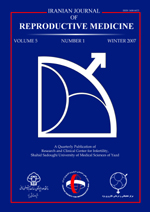
|
International Journal of Reproductive BioMedicine
Research and Clinical Center for Infertility, Shahid Sadoughi University of Medical Sciences of Yazd
ISSN: 1680-6433
EISSN: 1680-6433
Vol. 17, No. 12, 2019, pp. 923-928
|
 Bioline Code: rm19094
Bioline Code: rm19094
Full paper language: English
Document type: Research Article
Document available free of charge
|
|
|
International Journal of Reproductive BioMedicine, Vol. 17, No. 12, 2019, pp. 923-928
| en |
The incidence rate of unresponsive thin endometrium in frozen embryo transfer cycles: A case-series of therapy with granulocyte colony stimulating factor
Miralaei, Shokouhosadat; Ashrafi, Mahnaz; Arabipoor, Arezoo; Zolfaghari, Zahra & Taghvaei, Saeideh
Abstract
Background: Treatment-resistant thin endometrium (TTE) during in-vitro fertilization is
a relatively uncommon and challenging problem.
Objective: The primary aim of the study was to assess the TTE rate during frozen
embryo transfer (FET) cycles and the secondary aim was to evaluate the effect of
intrauterine instillation of granulocyte colony stimulating factor (G-CSF) in these cases.
Materials and Methods: In this cross-sectional study, all of the women who underwent
FET cycles with hormonal endometrial preparation in Royan Institute from June 2015
to March 2018 were evaluated and all of the cases with TTE diagnosis (endometrial
thickness < 7 mm after using high doses of estradiol) were included. In the eligible
cases, 300 μgr of G-CSF was infused intrauterine. If the endometrium had not reached
at least a 7-mm, a second infusion was prescribed within 48 hr later.
Results: During the study, 8,363 of FET cycles were evaluated and a total of 30 infertile
patients (0.35%) with TTE diagnosis were detected. Finally, 20 eligible patients were
included. The changes of endometrial thickness after G-CSF therapy were significant
(p < 0.001); however, the endometrial thickness did not reach 7 mm in nine patients
(45%) and the embryo transfer was canceled.
Conclusion: It was found that the rate of TTE during the FET cycle is very low and
intrauterine perfusion of G-CSF has a potential effect to increase the endometrial
thickness in these patients; however, the rate of cancellation was still high and poor
pregnancy outcomes were observed.
Keywords
Granulocyte colony-stimulating factor; Cryopreservation; Embryo transfer; Endometrial diseases.
|
| |
© Copyright 2019 - Miralaei et al.
Alternative site location: http://www.ijrm.ir
|
|
